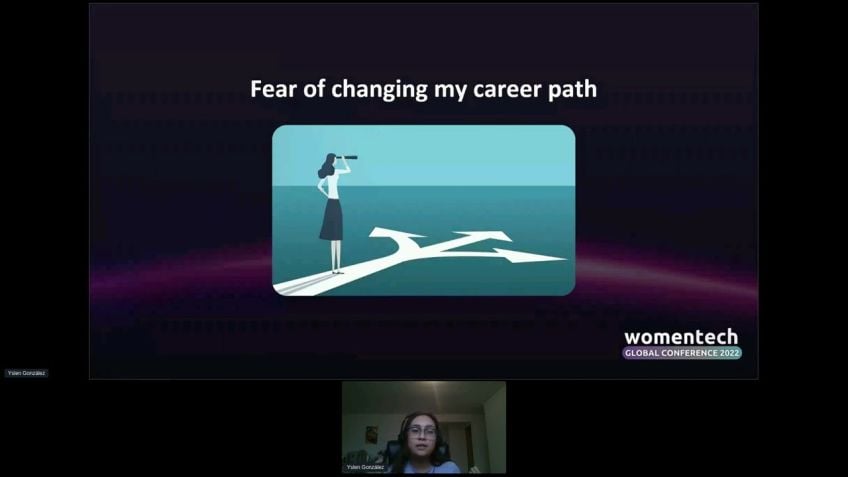DevOps is not a role, its a culture by Sneha Poddar
DevOps: Not a Role, but a Culture
Written by Sneha Podar
Hello everyone! My name is Sneha Podar and today we are going to discuss the concept that "DevOps is not a role but a culture". I honed my skills at Carnegie Mellon University, studying Masters of Information Systems Management, and now I am working as a Technical Lead at Chamber, having joined as a cloud software engineer.
What exactly is DevOps?
Courses and forums will explain DevOps as the combination of development and operations teams. The development team plans, writes, tests, and builds the code while the operations team ensures successful deployment and release of the features completed by the development team. However, the trouble enters with the division of responsibility.
The Problem with DevOps as a role
The common issue is that the team often ends up working in silos. The development unit has no real connection or knowledge of the tasks performed by the operations team, and vice versa. This disconnect can cause a 'confusion wall', with complications such as the wrong build being deployed to the wrong environment.
Solution: A DevOps Culture
By promoting a DevOps culture, we can break down this wall, and enable each team member to fulfil any role requirements. Furthermore, the developer now has end-to-end responsibility, taking on tasks from writing and testing the code to deploying it, ensuring no production issues.
Benefits of Adopting a DevOps Culture
During my time working in different team environments, I've noticed several benefits to adopting a DevOps culture, including:
- Improved team productivity
- Increased collaboration and trust
- Enhanced product quality and reliability
- Speed increase in delivery
- Higher levels of customer satisfaction
- Cuts in production costs
How to Initiate a DevOps Culture
Being flexible in the team requires bridging the skill gap by learning new technologies. Automation is paramount for a successful DevOps culture, with an emphasis on automating as many processes as possible.
Key Steps to Start
For beginners, here are three key steps you can start doing today:
- Write automation tests. This is not a new concept, but key for any DevOps team.
- Use tools like Docker and Helm to automate the code deployment. This ensures faster product delivery.
- Leverage tools like Prometheus to continuously monitor the application and receive alerts in case of any issues.
In addition, my final advice is to change your mindset. This new culture requires accountability, responsibility for your work from end to end and adaptability to such a culture, given that there initially could be a learning curve which might slow down the process.
Remember to continuously integrate and release the code as obtaining quick customer feedback is critical for a successful DevOps culture. Lastly, spread the knowledge about this culture within your team.
I really hope I have given some valuable insights and pointers to follow in achieving a successful DevOps culture. Let's step out of our comfort zones together. Thank you very much for your time.
Video Transcription
Hello, everyone. I'm Sneha Podar. And today I'll be talking about devops is not a role but a culture. Before I dive in deep into my topic, I would like to talk a little bit about myself and introduce myself.I graduated from Carnegie Mellon University where I studied Masters of Information Systems Management. Soon after my graduation, I joined chamber as a cloud software engineer and I'm currently working as a technical lead there. So what exactly is Devops? As the team says, it's the combination of development team and the operation team. The development team identifies the task plans for it, writes code tests and builds their code. Whereas the operation team ensures deployment and release of the features completed by the development team and constantly monitors the code written by the development team. So what exactly is the problem with the DE S as a role within a particular team? One of the biggest problem that I have faced is the team is usually working in silos. The development team has no idea about deployment release or any task that has been performed by the operation operations team, whereas the vice versa is also true, the operational team has no idea about what feature is currently being developed.
This often results in a wall of confusion where the operation team has no idea about which build of which service to be deployed to which environment. And there is often wrong bill deployed to the wrong environment resulting in the production issues. Thus, we solve this problem by eliminating this wall between the development team and the ops team by promoting a devops culture. Within a team. We basically empower each team member to be anyone they can be as per the requirement. The developer now has end to end responsibility, not only to write his code, but also to deliver the code all the way to production. Basically, he is writing the code, testing the code building, deploying and constantly also monitoring the code to ensure there are no production issues.
So now that we have understood what exactly is devops as a role and devops as a culture, let me tell you some of the benefits of devops as a culture. In the last five years, I have worked both as a devops as a role and as a devops in a culture team. The teams in which we have followed devops as a culture. I have significantly noticed an increase in the team productivity, collaboration and trust. It also increases the product quality, reliability and the speed of delivery. In return of all of these things, the team is able to provide higher customer satisfaction needless to see if needless to say if the team is performing at a higher speed and delivering the products faster, the cost of production goes down and thereby there is a huge reduction in the cost to deliver the same product with time.
Now that we have talked about a little bit about the benefits of the DEV ops culture. Let me share how to initiate a devops culture within your team starting today. To be anyone in a team, one needs to identify the skill gap and bridge that gap by learning the technologies that are missing. For example, if a developer needs to be a ops person, he needs to also learn the tools of the operations deployment, etc, he needs to know Docker, he etc to deploy his code. The next key take away is automation. A foundation of any of the Devops culture lies in automation. A team's goal should be always to automate as many processes as possible. Something that you can start doing from today is at least the top three things you can write automation test, which is not something new to the Dews culture. Most of the teams, whether they follow the culture or not, they are already writing automation testing. So if you are already writing it, you're already done with at least one thing. The next thing is using tools like Docker helm etc to automate the code deployment. The benefit of automating the code deployment is that you don't have to manually deploy and roll it back.
If there is any issues, this ensures faster delivery of the product. You can also leverage tools like Prometheus to continuously monitor the tools, monitor the application and alerts in case of any issues. Last and not the least. My last advice to anybody who wants to step out of their comfort zone and try to be anybody in the team today is to change their mindset. The change of mindset starts with being accountable for your work and taking responsibility from end to end with this new change in culture, there is bound to be a learning curve which takes time and it will slow down the process initially. But with time, the process and the product delivery will definitely increase. Meanwhile, it's important to not have features guilt. As initially, you won't be able to deliver the same amount of features you would deliver. The main reason being you're constantly learning the tools that you have not used before so that you can perform the entire Devops operations lastly, continuously integrate and release the code. Traditionally, whether we are following a Gile or following the devops practice or not.
It was mostly that we used to release the code to production at least once in a sprint or maybe sometimes once in two sprints. This is when having continuously integrating the code and getting a quick customer feedback is very important for a successful devops culture. With this, I would like to thank everybody who has attended my talk today. And I hope I have motivated you and given you some pointers to follow the Dews culture. I would ask everybody to motivate your team also and spread the knowledge about Des culture. Last but not the least. I would thank all the references that I have referred online in the last five years to learn more about the Devops culture. Thank you.





